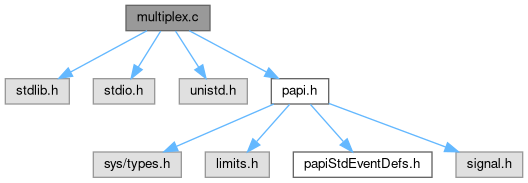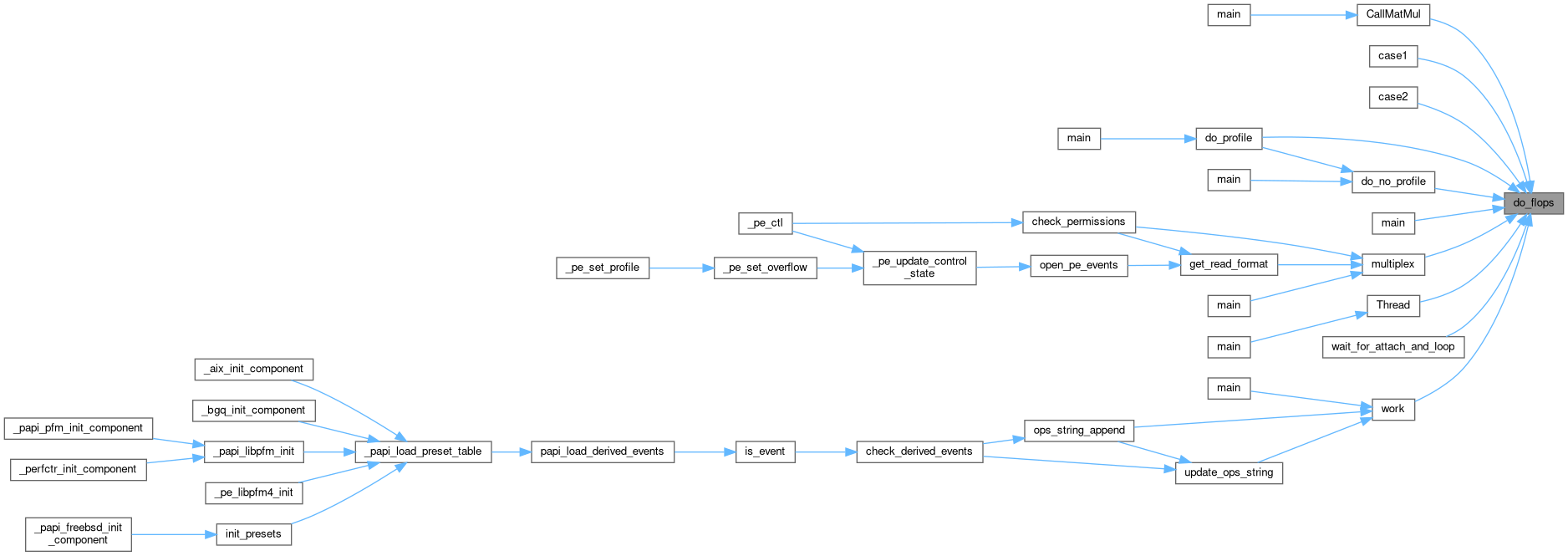Loading...
Searching...
No Matches
Include dependency graph for multiplex.c:

Go to the source code of this file.
Macros | |
| #define | ERROR_RETURN(retval) { fprintf(stderr, "Error %d %s:line %d: \n", retval,__FILE__,__LINE__); exit(retval); } |
| #define | NUM_ITERS 10000000 |
| #define | MAX_TO_ADD 6 |
Functions | |
| void | do_flops (int n) |
| int | multiplex (void) |
| int | main (int argc, char **argv) |
Variables | |
| double | c = 0.11 |
Macro Definition Documentation
◆ ERROR_RETURN
| #define ERROR_RETURN | ( | retval | ) | { fprintf(stderr, "Error %d %s:line %d: \n", retval,__FILE__,__LINE__); exit(retval); } |
Definition at line 17 of file multiplex.c.
◆ MAX_TO_ADD
| #define MAX_TO_ADD 6 |
Definition at line 20 of file multiplex.c.
◆ NUM_ITERS
| #define NUM_ITERS 10000000 |
Definition at line 19 of file multiplex.c.
Function Documentation
◆ do_flops()
| void do_flops | ( | int | n | ) |
Definition at line 23 of file multiplex.c.
24{
28
31 return;
32}
Here is the caller graph for this function:

◆ main()
Definition at line 142 of file multiplex.c.
143{
144
146 printf("Does PAPI_multiplex_init() handle lots of events?\n");
147 multiplex();
148 exit(0);
149}
Here is the call graph for this function:

◆ multiplex()
| int multiplex | ( | void | ) |
Definition at line 35 of file multiplex.c.
36{
39 PAPI_event_info_t pset;
41
42 /* Initialize the library */
45 {
46 printf("Library initialization error! \n");
47 exit(1);
48 }
49
50 /* initialize multiplex support */
54
58
59 /* convert the event set to a multiplex event set */
63/*
64 retval = PAPI_add_event(EventSet, PAPI_TOT_INS);
65 if ((retval != PAPI_OK) && (retval != PAPI_ECNFLCT))
66 ERROR_RETURN(retval);
67 printf("Adding %s\n", "PAPI_TOT_INS");
68*/
69
71 {
75
77 {
79
83
86 else
87 printf("Could not add %s due to resource limitation.\n",
88 pset.symbol);
89
91 {
93 break;
94 }
95 }
96 }
97
100 {
101 printf("Not enough memory available. \n");
102 exit(1);
103 }
104
107
109
113
114 /* get the number of events in the event set */
115 number=MAX_TO_ADD;
118
119 /* print the read result */
121 {
126 }
127
131
135
136 /* free the resources used by PAPI */
137 PAPI_shutdown();
138
139 return (0);
140}
add PAPI preset or native hardware event to an event set
Empty and destroy an EventSet.
Create a new empty PAPI EventSet.
Empty and destroy an EventSet.
Get the event's name and description info.
initialize the PAPI library.
list the events in an event set
Initialize multiplex support in the PAPI library.
Convert a standard event set to a multiplexed event set.
Finish using PAPI and free all related resources.
Start counting hardware events in an event set.
Stop counting hardware events in an event set.
Definition: papi.h:957
Here is the call graph for this function:

Here is the caller graph for this function:

Variable Documentation
◆ c
| double c = 0.11 |
Definition at line 22 of file multiplex.c.